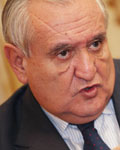| To mark the 50th anniversary of the establishment of Sino-French diplomatic relations, Beijing Review conducted an exclusive interview with Jean-Pierre Raffarin, former Prime Minister of France and current Vice President of the French Senate. Over many years, Raffarin has become the essential link in relations between the two countries. Excerpts follow:
Beijing Review: What is your overall impression of Sino-French relations, at a time when the two countries celebrate the 50th anniversary of the establishment of diplomatic relations?

Jean-Pierre Raffarin: Relations between China and France are excellent. The recent official visits were real successes and our strategic partnership is strong. We should put our economic exchanges on the same level as our political relationship. This is a priority for our common future. The 400 friendly events taking place this year will contribute to this.
You made your first trip to China in 1976 as part of a delegation with President Valery Giscard d'Estaing. What was your task at that time? What was your first impression of China?
I had already been to Hong Kong and Macao in 1971. We were looking at the Chinese mainland from a distance. It was fascinating and mysterious. I was already sizing up the influence of the great Chinese people of this region. Then I crossed China in 1976, from Harbin to Guangzhou. It was a difficult period, but we had come to tell our Chinese friends that France loved their ancient and fascinating civilization, beyond the trials that China was going through at the time. I felt at ease immediately dealing with the Chinese people. Despite everything there was between us, I felt a sense of proximity, which never faded.
During your term as prime minister, economic and cultural relations between China and France developed rapidly, in a favorable political context. Which of the events made a particular impression on you?
I particularly remember the Year of Cultural Exchange in 2005, which contributed a lot to the friendship between our two peoples. I will never forget the red Eiffel Tower and the Shanghai TV Tower in blue, white and red. The establishment of the Airbus factory in Tianjin was also a big moment for me. I have a strong memory of the exceptional visit that President Hu made to Hotel Matignon, the prime minister's residence. I often think of the courage of the people of Sichuan after the earthquake.
You were the best person to pass information between the French and Chinese sides when bilateral relations deteriorated between 2008 and 2009. How would you evaluate your role during that time?
From experience I had learned that it was best to be honest and direct with the Chinese authorities. Dialogue is often direct, so we need to understand that the Chinese don't want to be hostages of our domestic debates. In the modern world, it is not possible to be a friend in China and an enemy when you go back to Europe. Therefore, when the West gives Western lessons to China through the Western media, the Chinese don't appreciate it. I favored direct discussions, without an intermediary, making a choice of confidence. We worked well with [Premier] Li Keqiang to build mutual respect.
Chirac was passionate about Chinese bronze works, and you are interested in Chinese literature and poetry. Which ancient or contemporary writers and poets do you admire the most?
I really like the poetry of Du Fu, Bai Juyi, Li Bai and Meng Haoran [famous poets of the Tang Dynasty (618-907)]. I also like modern poetry, for example the poetry of my friend Li Zhaoxing. I love Fan Zeng's portraits and Fan Yifu's mountains and also Li Xin's paintings... China has an infinite number of awe-inspiring things. Its museums are wonderful.
France was the first Western country to make sinology a full university discipline. What do you see as the strengths and advantages of sinology in France compared to other countries? What role do French sinologists play in exchanges between our two countries and decision making on a governmental level?
Intellectuals such as Francois Jullien have demonstrated that ancient and profound Chinese thinking can help the 21st century world to better understand the reality it faces. The "complex thought" proposed by a thinker like Edgar Morin is not unrelated to Chinese culture. The paradoxical thinking in China helps us to live with our Western obsession with the absolute. Harmony is a growing aspiration in a number of societies.
China teaches us to write the word "truth" in the plural, whereas we had been used to putting it in the singular.
| 